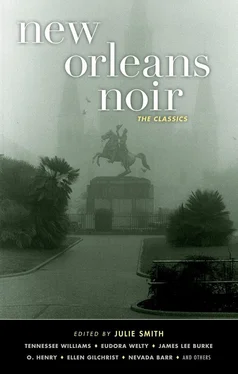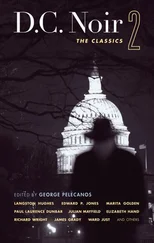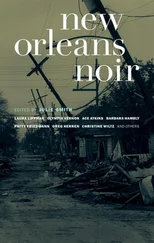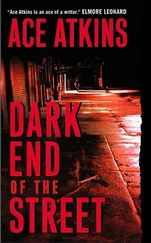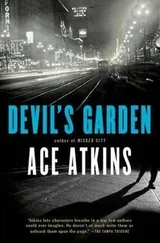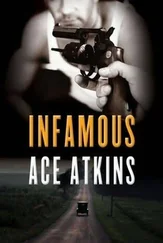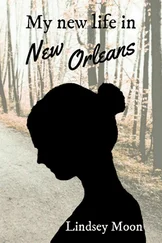Ace Atkins - New Orleans Noir - The Classics
Здесь есть возможность читать онлайн «Ace Atkins - New Orleans Noir - The Classics» весь текст электронной книги совершенно бесплатно (целиком полную версию без сокращений). В некоторых случаях можно слушать аудио, скачать через торрент в формате fb2 и присутствует краткое содержание. Город: New York, Год выпуска: 2016, ISBN: 2016, Издательство: Akashic Books, Жанр: Детектив, на английском языке. Описание произведения, (предисловие) а так же отзывы посетителей доступны на портале библиотеки ЛибКат.
- Название:New Orleans Noir: The Classics
- Автор:
- Издательство:Akashic Books
- Жанр:
- Год:2016
- Город:New York
- ISBN:978-1-61775-384-8
- Рейтинг книги:3 / 5. Голосов: 1
-
Избранное:Добавить в избранное
- Отзывы:
-
Ваша оценка:
- 60
- 1
- 2
- 3
- 4
- 5
New Orleans Noir: The Classics: краткое содержание, описание и аннотация
Предлагаем к чтению аннотацию, описание, краткое содержание или предисловие (зависит от того, что написал сам автор книги «New Orleans Noir: The Classics»). Если вы не нашли необходимую информацию о книге — напишите в комментариях, мы постараемся отыскать её.
takes a literary tour through some of the darkest writing in New Orleans history.
New Orleans Noir: The Classics — читать онлайн бесплатно полную книгу (весь текст) целиком
Ниже представлен текст книги, разбитый по страницам. Система сохранения места последней прочитанной страницы, позволяет с удобством читать онлайн бесплатно книгу «New Orleans Noir: The Classics», без необходимости каждый раз заново искать на чём Вы остановились. Поставьте закладку, и сможете в любой момент перейти на страницу, на которой закончили чтение.
Интервал:
Закладка:
Tom Wilson considered himself a natural as a banker because he loved to gamble and wheel and deal. From the time he was a boy in a small Baptist town in Tennessee he had loved to play cards and match nickels and lay bets.
In high school he read the Nashville Banner avidly and kept an eye out for useful situations such as the lingering and suspenseful illnesses of Pope Pius.
“Let’s get up a pool on the day the Pope will die,” he would say to the football team, “I’ll hold the bank.” And because the Pope took a very long time to die with many close calls there were times when Tom was the richest left tackle in Franklin, Tennessee.
Tom had a favorite saying about money. He had read it in the Reader’s Digest and attributed it to Andrew Carnegie. “Money,” Tom would say, “is what you keep score with. Andrew Carnegie.”
Another way Tom made money in high school was performing as an amateur magician at local birthday parties and civic events. He could pull a silver dollar or a Lucky Strike cigarette from an astonished six-year-old’s ear or from his own left palm extract a seemingly endless stream of multicolored silk chiffon or cause an ordinary piece of clothesline to behave like an Indian cobra.
He got interested in magic during a convalescence from German measles in the sixth grade. He sent off for books of magic tricks and practiced for hours before his bedroom mirror, his quick clever smile flashing and his long fingers curling and uncurling from the sleeves of a black dinner jacket his mother had bought at a church bazaar and remade to fit him.
Tom’s personality was too flamboyant for the conservative Whitney Bank, but he was cheerful and cooperative and when he made a mistake he had the ability to turn it into an anecdote.
“Hey, Fred,” he would call to one of his bosses. “Come have lunch on me and I’ll tell you a good one.”
They would walk down St. Charles Avenue to where it crosses Canal and turns into Royal Street as it enters the French Quarter. They would walk into the crowded, humid excitement of the quarter, admiring the girls and watching the Yankee tourists sweat in their absurd spun-glass leisure suits, and turn into the side door of Antoine’s or breeze past the maitre d’ at Galatoire’s or Brennan’s.
When a red-faced waiter in funereal black had seated them at a choice table, Tom would loosen his Brooks Brothers tie, turn his handsome brown eyes on his guest, and begin.
“That bunch of promoters from Dallas talked me into backing an idea to videotape all the historic sights in the quarter and rent the tapes to hotels to show on closed-circuit television. Goddamnit, Fred, I could just see those fucking tourists sitting around their hotel rooms on rainy days ordering from room service and taking in the Cabildo and the Presbytere on TV.” Tom laughed delightedly and waved his glass of vermouth at an elegantly dressed couple walking by the table.
“Well, they’re barely breaking even on that one, and now they want to buy up a lot of soft-porn movies and sell them to motels in Jefferson Parish. What do you think? Can we stay with them for a few more months?”
Then the waiter would bring them cold oysters on the half shell and steaming pompano en papillote and a wine steward would serve them a fine Meursault or a Piesporter, and Tom would listen to whatever advice he was given as though it were the most intelligent thing he had ever heard in his life.
Of course he would be thinking, You stupid, impotent son of a bitch. You scrawny little frog bastard, I’ll buy and sell you before it’s over. I’ve got more brains in my balls than the whole snotty bunch of you.
“Tom, you always throw me off my diet,” his friend would say, “damned if you don’t.”
“I told Letty the other day,” Tom replied, “that she could just go right ahead and spend her life worrying about being buried in her wedding dress, but I didn’t hustle my way to New Orleans all the way from north Tennessee to eat salads and melba toast. Pass me the French bread.”
Letty fell in love with Tom the first time she laid eyes on him. He came to Tulane on a football scholarship and charmed his way into a fraternity of wealthy New Orleans boys famed for its drunkenness and its wild practical jokes. It was the same old story. Even the second-, third-, and fourth-generation blue bloods of New Orleans need an infusion of new genes now and then.
The afternoon after Tom was initiated, he arrived at the fraternity house with two Negro painters and sat in the low-hanging branches of a live oak tree overlooking Henry Clay Avenue, directing them in painting an official-looking yellow-and-white-striped pattern on the street in front of the property. “D-R-U-N-K,” he yelled to his painters, holding on to the enormous limb with one hand and pushing his black hair out of his eyes with the other. “Paint it to say D-R-U-N-K Z-O-N-E. ”
Letty stood near the tree with a group of friends watching him. He was wearing a blue shirt with the sleeves rolled up above his elbows, and a freshman beanie several sizes too small was perched on his head like a tipsy sparrow.
“I’m wearing this goddamn beanie forever,” Tom yelled. “I’m wearing this beanie until someone brings me a beer,” and Letty took the one she was holding and walked over to the tree and handed it to him.
One day a few weeks later, he commandeered a Bunny Bread truck while it was parked outside the fraternity house making a delivery. He picked up two friends and drove the truck madly around the Irish Channel, throwing fresh loaves of white and whole wheat and rye bread to the astonished housewives.
“Steal from the rich, give to the poor,” Tom yelled, and his companions gave up trying to reason with him and helped him yell.
“Free bread, free cake,” they yelled, handing out powdered doughnuts and sweet rolls to a gang of kids playing baseball on a weed-covered vacant lot.
They stopped off at Darby’s, an Irish bar where Tom made bets on races and football games, and took on some beer and left off some cinnamon rolls.
“Tom, you better go turn that truck in before they catch you,” Darby advised, and Tom’s friends agreed, so they drove the truck to the second-precinct police headquarters and turned themselves in. Tom used up half a year’s allowance paying the damages, but it made his reputation.
In Tom’s last year at Tulane a freshman drowned during a hazing accident at the Southern Yacht Club, and the event frightened Tom. He had never liked the boy and had suspected him of being involved with the queers and nigger lovers who hung around the philosophy department and the school newspaper. The boy had gone to prep school in the East and brought weird-looking girls to rush parties. Tom had resisted the temptation to blackball him as he was well connected in uptown society.
After the accident, Tom spent less time at the fraternity house and more time with Letty, whose plain sweet looks and expensive clothes excited him.
“I can’t go in the house without thinking about it,” he said to Letty. “All we were doing was making them swim from pier to pier carrying martinis. I did it fifteen times the year I pledged.”
“He should have told someone he couldn’t swim very well,” Letty answered. “It was an accident. Everyone knows it was an accident. It wasn’t your fault.” And Letty cuddled up close to him on the couch, breathing as softly as a cat.
Tom had long serious talks with Letty’s mild, alcoholic father, who held a seat on the New York Stock Exchange, and in the spring of the year Tom and Letty were married in the Cathedral of Saint Paul with twelve bridesmaids, four flower girls, and seven hundred guests. It was pronounced a marriage made in heaven, and Letty’s mother ordered Masses said in Rome for their happiness.
Читать дальшеИнтервал:
Закладка:
Похожие книги на «New Orleans Noir: The Classics»
Представляем Вашему вниманию похожие книги на «New Orleans Noir: The Classics» списком для выбора. Мы отобрали схожую по названию и смыслу литературу в надежде предоставить читателям больше вариантов отыскать новые, интересные, ещё непрочитанные произведения.
Обсуждение, отзывы о книге «New Orleans Noir: The Classics» и просто собственные мнения читателей. Оставьте ваши комментарии, напишите, что Вы думаете о произведении, его смысле или главных героях. Укажите что конкретно понравилось, а что нет, и почему Вы так считаете.
